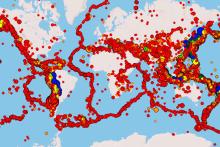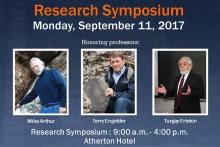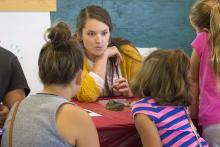Getting to the core of the problem of teaching young students about the dynamic Earth is the impetus of a four-year, $2.8 million grant awarded to Penn State Associate Professor Scott McDonald.
CAUSE 2018: Living on the Edge – Plate Tectonics and Society (EMSC 470 Sp/Su/Fall 2018) is an exploration of plate tectonics, from its mechanics to the role it plays in our society. The three semster course includes travel during Maymester 2018 where students will be able to trace the evolution of the western U.S. from Portland to San Francisco. Students will carry out individual and team-based projects of their choosing, and will work together virtually and in person across the three semesters.
A research symposium honoring three earth and mineral sciences emeritus professors will be held from 9 a.m. to 4 p.m. on Sept. 11, in the Atherton Hotel’s Vanderbilt Room in State College, Pennsylvania. The symposium will feature speakers discussing the impact of the careers of Michael Arthur, professor emeritus of geosciences; Terry Engelder, professor emeritus of geosciences; and Turgay Ertekin, professor emeritus of petroleum and natural gas engineering.
As rows of tents dotted the countryside, the Grange Fair offered a chance to get back to more simple times. But for members of the group WE ARE for Science, it was a chance to shape the future of science policy, education and public outreach. About 40 members of the group recently spent a day at the fair fielding questions from kids and parents alike, in areas such as astronomy, entomology and geosciences at their “Ask a Scientist” event.
Shawn Domagal-Goldman, NASA, Goddard Space Flight Center, will give a talk TBD.
Francis Macdonald, professor of Earth and planetary sciences at Harvard University, will give the talk "Geological context for long-term climate change."
Daniella Rempe, assistant professor of geosciences at the University of Texas, will give the talk "Direct measurements of water storage dynamics in Earth's Critical Zone: the implications of rock moisture on geochemical and ecological processes."
Allen McNamara, Endowed Professor of Geological Sciences at Michigan State University, will give the talk "Multiscale compositional heterogeneity in Earth's mantle and its implications for hotspot volcanism and chemistry."
Mark Clementz, professor of paleobiology at the University of Wyoming, will give a talk TBD.
Douglas Bird, associate professor of anthropology and director of the Center for Human Ecology, will give the talk "Livelihoods, fire regimes, and novel ecosystems in Indigenous Australia."




